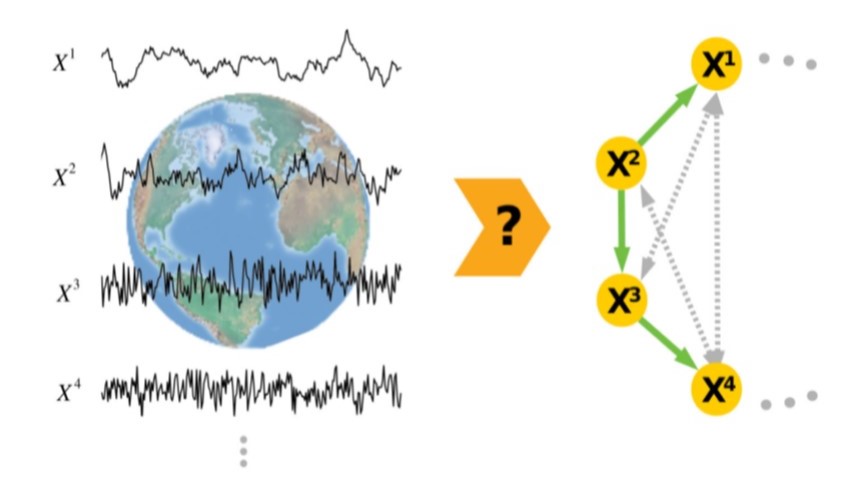-
A research group of the Image Processing Laboratory (IPL), a unique center of the scientific-academic area of the University of Valencia Science Park (PCUV), presents recent advances in causal inference and the opportunities of this deduction process for research in Earth and environmental sciences
-
New algorithms integrate causal reasoning using (machine learning) techniques to improve understanding of climate and environmental problems
Distinguishing cause and effect is a task that has occupied scientists and philosophers for millennia. Inferring what is cause and what is effect in questions regarding nature is crucial for research in Earth and environmental sciences, since this will serve to improve the understanding of the determining factors the main climatic and environmental problems, beyond the simple statistical correlation.
Over the last few years, algorithms have been developed that improve the critical variables for monitoring the Earth and the ability to deduce causal relationships between variables has been increased by using only data. New analysis techniques based on time series data bring a novel approach to this field, as reflected in an article recently published in the journal Nature Reviews Earth & Environment.
In this review, a team from the Image Processing Laboratory (IPL), a unique center of the scientific-academic area of the University of Valencia Science Park (PCUV), in collaboration with universities and research centers in Germany, analyzes the results in this field and discusses the need and importance of deepening causal inference.
“Understanding and proving how changes in one variable cause changes in another is essential to develop more reliable and understandable artificial intelligence algorithms”, says Gustau Camps, Professor of Electronic Engineering at the University of Valencia, researcher at the Image Processing Laboratory (IPL) and primary author of the article. “Without causal inference, artificial intelligence is limited; it cannot detect the why of things. However, current causal methods can already identify whether a variable is cause or effect, and all from measurements and observations of time series,” he continues. “This will allow informed decisions on environmental policies, urban planning and adaptation to climate change, which directly impact society, the economy and sustainability,” adds Gherardo Varando, member of the research team at the IPL and co-author of the article.
“Without causal inference, artificial intelligence is limited; it cannot detect the why of things. However, current causal methods can already identify whether a variable is cause or effect, and all from measurements and observations of time series,” Gustau Camps, IPL researcher and lead author of the article
Causal inference for time series, as the article is titled, reviews the existing families of methods, presents the advantages and disadvantages of each of them and gives practical examples of application in environmental sciences. It also summarizes the possibilities of developing causal prediction algorithms that are more robust, more reliable and more explainable; evaluates the codes available for each specific problem; and presents a web platform where scientists can validate their causal results.
The integration of causal thinking into data-driven science will facilitate the understanding of processes and the development of more robust machine learning and statistical models for Earth and environmental sciences. Medicine, economics and agriculture, among others, are sectors that could benefit from these advances. "This is an extremely useful field and we already have operational algorithms to attack real problems," conclude the scientists from the Universitat de València.
Led by Jakob Runge of the German Space Agency (DLR), the article counts with the participation of the Image Processing Laboratory (IPL) of the Universitat de València, the Technische Universität Berlin and the University of Bremen (Germany).
Reference:
Jakob Runge, Andreas Gerhardus, Gherardo Varando, Veronika Eyring & Gustau Camps-Valls. Causal inference for time series. Nature Reviews Earth & Environment 4, 487-505 (2023). https://doi.org/10.1038/s43017-023-00431 and https://t.co/kE6wENjGFa


